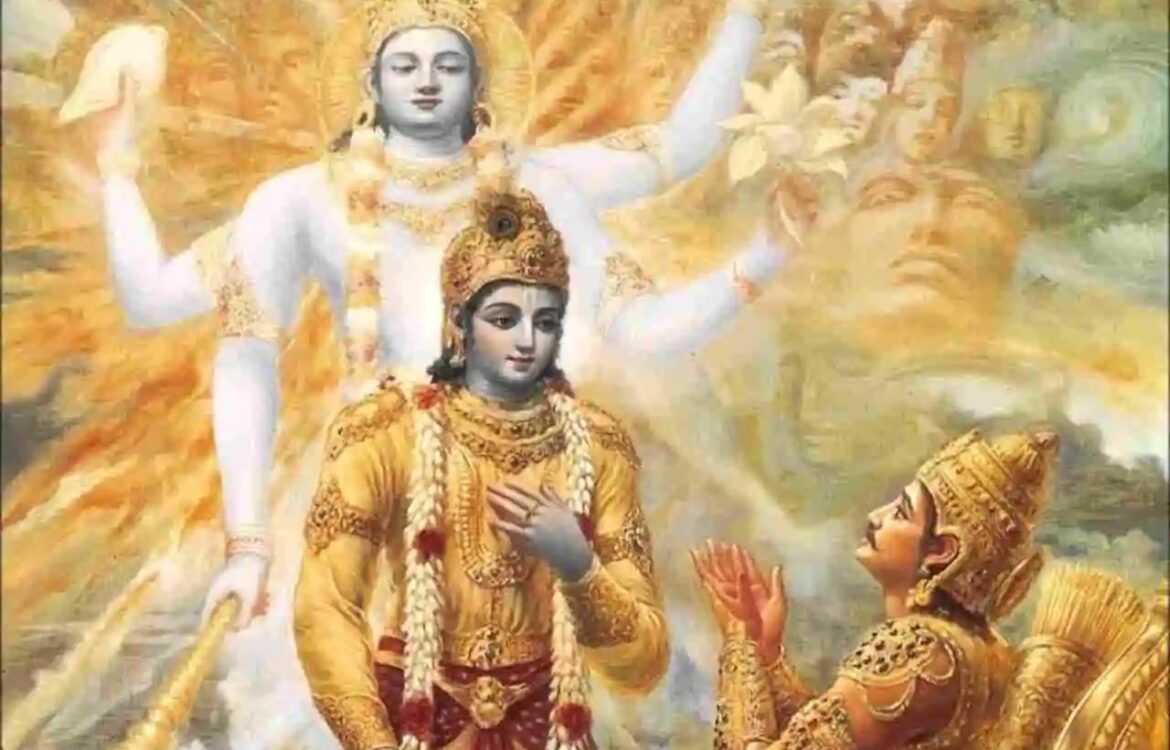Chapter 7 – Dnyanvidnyanyoga (Prapatti or Surrender to God)
Summary:
The Sixth Chapter tells about one-pointedness of mind necessary for spiritual pursuit.
The Seventh Chapter opens before us the gallery of a magnificent new vikarma.It now unfolds before us a new vista.Even before unfolding this vista, let us see the secret of the structure of this world, the way Lord has revealed.
All this internal and external world is made up of two things—the eternal Self and the eight-fold prakriti(Eightfold means Earth, water, fire, air, space, mind, reason and ego—these are the eight-fold divisions). The anger of the angry man, the love of the lover, the agony of the sufferer, the happiness of the happy one, the drowsiness of the idler, the activity of the industrious man—all these are manifestations of one and the same Cosmic energy.The Lord is telling at the very outset that the Self, full of consciousness, and the insentient ( having inertia) prakriti are the twin source from which all the creation has come into being.
The Self and the body, the higher and the lower( para and apara) prakriti are the same everywhere. Why should man be deluded then? This is an art of Paramatma who created this Universe.If you want to avoid delusion then you must be able to identify that paramatma.
In this Seventh Chapter, the Lord has thrown open the beautiful mansion of bhakti, a singularly effective means,a great vikarma for knowing Him. To attain purity of mind, many vikarmas like yajna (sacrifice), dana (sharing, charity), japa (prayer, repeating God’s Name), tapa (penance), meditation and concentration are prescribed.How can there be purity of mind if the heart and soul are not there in yajna, meditation, penance etc.? Bhakti is nothing but such involvement of the heart and soul.
We all are happy when we get the pleasures received by five senses(panchendriyas).Ex.Hearing song,eating tasty food,seeing a nice picture etc.However these pleasures are for that moment only.But true joy ( permanand) is forever.Bhakti is the best way to discover true joy.
Bhakti for gains( sakam bhakti) too has value:
The Lord has mentioned three kinds of devotees (bhaktas) :
(i) one who has a desire for some worldly gains( sakam bhakta).
Lord says, “Even if my bhakta is desirous of some gains, I shall make his faith steadfast. I shall not create confusion in his mind. If he earnestly prays for getting cured of his disease, I shall cure him, supporting his will to health. Whatever may bring him to Me, I shall lovingly encourage him.”
Whatever be the ground, do enter the temple of bhakti. It will mark a new beginning for you. Even if the desires are initially there, they will eventually fade away.
(ii) one who is desireless, but whose bhakti has not blossomed fully.
This second type consists of three sub-types :
(a) one who is restless and impatient( आर्त ) for God’s grace
The bhakta of the first sub-type craves for the love of the Lord and cries for Him like Namdeva. He is restless and desperate to embrace the Lord and lay himself at His feet and have His love showered on him.
(b) The seeker of knowledge (जिज्ञासू)
The bhakta of the second sub-type is a seeker of knowledge.Persons of this type will risk their lives in trying again and again to climb Mount Everest and may perish in the attempt. Some may go on an expedition to the North Pole. Some may descend into the womb of a volcano to learn more about it.All these seekers too would eventually unite with the Lord.
(c) The seeker of the wellbeing of all (artharthi) .
The bhakta of the third sub-type has been called ‘artharthi’—one who seeks artha. Artha is commonly translated as money or wealth; but it really means welfare or well-being. Artharthi bhakta judges everything in terms of the good of society.
All those belonging to these three sub-types are no doubt desireless, but their approach is not holistic. They approach God either through work or through love or through knowledge.
(iii)Jnani, or the man of wisdom, whose bhakti has blossomed fully.
Whatever he sees are nothing but different forms of the Lord. In the handsome and the ugly, in the prince and the pauper, in men and women, in birds and beasts—everywhere he has the sacred vision of God. Even in an evil man, he sees the Lord testing and trying him. Thus he is constantly seeing Him everywhere. Doing so, one day, he ultimately merges into the Lord.
These are different branches of the tree of bhakti.

